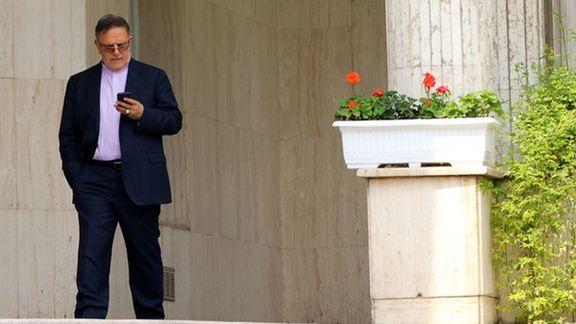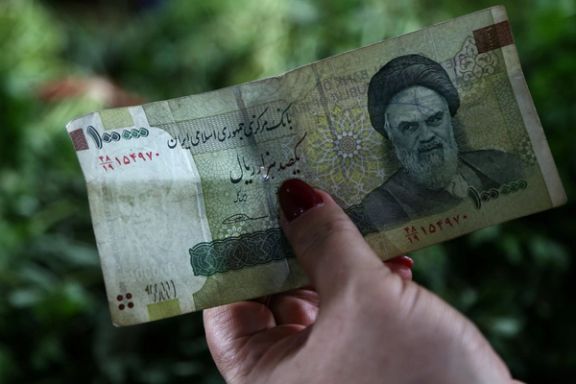Former Chief Banker Says Governance In Iran Encourages Corruption

As cases of economic corruption continue to make headlines in Iran, more pundits are speaking out about how the prevailing system makes corruption inevitable.

As cases of economic corruption continue to make headlines in Iran, more pundits are speaking out about how the prevailing system makes corruption inevitable.
In an interview published Sunday, former chief of Iran's central bank Valiollah Seif said the biggest challenge facing the country is economic corruption, mainly due to a government controlled system that that hands out privileges. The government also has a habit of regulating prices, including the subsidized cheap foreign currency given to a cherrypicked group of regime insiders.
Seif said as long as the government hands out dollars below the free market rate, there would be people who find ways to take advantage of it. “Any control mechanism, sooner or later, falls prey to some opportunistic individuals who are tempted by personal gain and ultimately, they devise ways to exploit the existing privilege system," he argued.
Seif headed the bank from 2013 to 2018, during the first six years of Hassan Rouhani’s presidency, but was himself accused of improper foreign currency transactions together with one his deputies, Ahmad Araghchi, nephew of Iran’s former chief nuclear negotiator, Abbas Araghchi. Seif was sentenced to 10 years in prison and a travel ban in 2021 for charges of improperly selling $160 million and €20 million on the open market. The Supreme Court annulled his sentence in 2021, explaining that he was just following the country’s macroeconomic policies.
Referring to the case of Debsh Tea Company -- labeled Iran’s biggest corruption case, Seif said when the free-market exchange rate for the dollar is about twice higher than the dollars provided by the central bank for imports, “it is evident that the likelihood of corruption increases... as some individuals are even encouraged" to exploit the system.

Debsh company, handling most of the country's tea imports, received a staggering $3.37 billion in foreign currency from the government on a preferential exchange rate for tea and machinery imports from 2019 to 2022. However, it allegedly sold $1.4 billion of the currency on the free market at a higher rate. The company also sold low-grade tea imported from Kenya as high-grade tea originating from India, with a $12 difference per kilogram. The embezzlement case of Debsh Tea Company involved officials from both the current and the previous presidential administrations -- including ministers of agriculture, industry as well as the governors of the Central Bank of Iran and the chiefs of Iranian Customs Administration, further proof that the country’s corruption is systematic.
In an article in Etemad daily earlier in the month, Iranian pundit Abbas Abdi said corruption in Iran should not be reduced to a moral or legal matter, noting that such a reductionism is the biggest mistake that institutionalizes corruption.
Abdi said that the Debsh case, which broke all corruption records in terms of the amount and the level of officials involved, shows that the country’s unclear and non-transparent regulations along with a lack of effective supervision or independent oversight pave the ground for widespread corruption. He said that justifications such as the need to circumvent sanctions or reduce prices open the way to corruption.
The rial has lost its value 12-fold since 2018 when the United States withdrew from the JCPOA nuclear accord and imposed sanctions. The government is desperate to control currency rates hoping that it can artificially keep the Iranian rial high. It created multiple exchange rates for rial against the dollar and other foreign currencies, providing subsidies – or cheaper dollars – for the import of essential items. However, the system is manipulated by regime insiders or businesspeople with government connections.
Another former chief banker, Abdolnaser Hemmati, an outspoken critic of the current administration’s economic policies, also said last month that the government has failed to control inflation or the devaluation of the rial. He said that the measures the government has taken to control the economy has led to more corrupt manipulations.
Systematic corruption is not something new in Iran's oil-dependent economy and has been repeatedly highlighted by various officials. Mohammad Sarafraz, the former chief of Iran's state television, who resigned his post in May 2016 has accused the government and banking system of systematic corruption that has led to vast income gaps among Iranians. He has argued that most of this corruption exists in quasi-public companies that enjoy the benefits of private firms but pretend to be government entities when they are paying taxes or reporting their financial status.
According to a report by the World Bank, Iran is among the worst countries in the world in terms of the Control of Corruption index, which evaluates the extent to which public power is exercised for private gain. According to Transparency International, which measures Corruption Perceptions Index (CPI), Iran ranked 150 out of 180 countries in 2021, one stop lower than a year earlier. Last month, former member of parliament Heshmatollah Fallahatpisheh claimed that the total embezzlements in major corruption cases in the Islamic Republic have reached a staggering $57 billion.